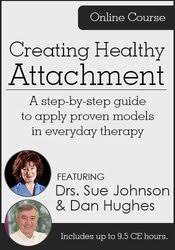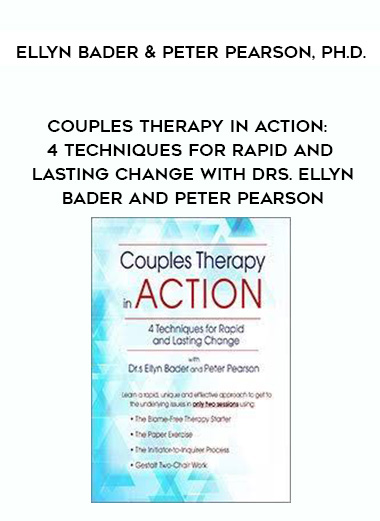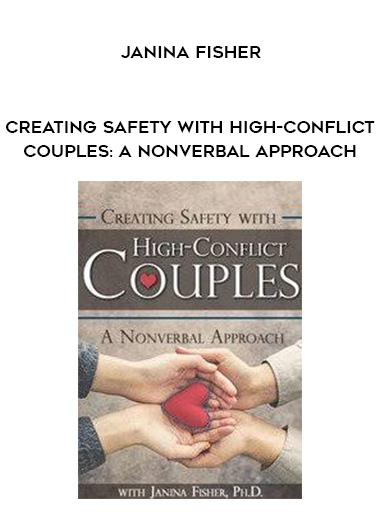CREATING HEALTHY ATTACHMENT: A STEP-BY-STEP GUIDE TO APPLY PROVEN MODELS IN EVERYDAY THERAPY – DANIEL A. HUGHES & SUSAN JOHNSON
For years, couple and family therapists failed to provide deep healing because they focused on stopping arguments and teaching clients to fight fair instead of creating lasting change.
Fortunately, advances in our understanding of Attachment Theory has changed our field…
For the first time, we can offer clients secure and satisfying connections by exploring and systematically targeting key elements of the complex dramas that occur within relationships.
In this intensive online course, you’ll discover how to combine the empirically validated Emotionally Focused Couple Therapy, (arguably the most effective and extant intervention for couples) with the healing power of Dyadic Developmental Psychotherapy to help couples, children, and families grow within their relationships – even in the presence of complex issues such as trauma, abuse or neglect.
If you’re ready to help your clients create more loving and affectionate connections with the people they depend on and the people who depend on them, join me and my colleague Dr. Dan Hughes in this intensive online course.
Attachment — Cradle to Grave: Intimate and Interactive Conversations with Dr. Sue Johnson and Dr. Dan Hughes
Through intimate and interactive conversations, watch both Dr. Sue Johnson and Dr. Dan Hughes as they take you, step-by-step, through the proven models of Emotional Focused Therapy and Dyadic Developmental Psychotherapy to support the children, families, and couples you work with.
Module 1 :
The Framework of EFT and Attachment – Part 1
- Understanding the logic behind love
- Exploring the “EFT Tango”
- Examining the “New Era” of couple therapy: The science of attachment theory
- Understanding the importance of a secure emotional connection
- Using EFT to make sense of the nature of relationships
Module 2 :
The Framework of EFT and Attachment – Part 2
- Changing your client’s responsiveness to threat with EFT
- Focusing on primary affect: How attachment shows you pivotal moments in relationships
- Exploring EFT core assumptions
- Understanding the code of attachment and primary needs
- Mapping the landscape of love with Attachment Theory
- Breaking down the stages and steps of EFT
Module 3 :
The Essentials of Dyadic Development Psychotherapy – Part 1
- Exploring attunement & rhythmic expression
- Understanding the importance of intersubjectivity
- Using curiosity to develop a perception
- Using attachment to understand developmental trauma
- Incorporating self-regulation for the therapist and the child client
- Understanding discipline in secure attachments vs. insecure attachments
Module 4 :
The Essentials of Dyadic Development Psychotherapy – Part 2
- Speaking for the child: Verbal and non-verbal responses
- Using the PACE mode to foster safety
- PACE
- Playful
- Accepting
- Curious
- Empathetic
Module 5 :
First Panel Discussion with Dr. Sue Johnson and Dr. Dan Hughes
- How does EFT work with issues of rigid gender views, or a controlling dynamic?
- Creating safety with couples
- Creating safety with children
- What strategy does the therapist use to recognize their emotional response?
- How do you deal with dissociation in children?
Module 6
Applying EFT within an Attachment Framework The Essentials of Dyadic Development Psychotherapy – Part 3
- Using a storytelling rhythm to engage children with an affective/reflective component
- Working with parents before the current session
- to assess what’s happened since the last session
- Continuing the rhythm through the hard parts
- of therapy
- Understanding the importance Connect – Break – Repair: How to repair breaks in relationships
- Noticing and making meaning out of non-verbal communication
- Starting sessions with experiential before moving into reflection
Module 7 :
Applying EFT within an Attachment Framework
- Connecting with your partner: The “Still Face Experiment”
- Exploring how couples react to emotional disconnection
- Understanding the stages of EFT:
- EFT Stage1: De-escalation
- EFT Stage 2: Restructuring the Bond
- EFT Stage 3: Consolidation
- Mastering interventions in EFT through reflection
- Understanding the importance of validation in creating safety
- Explaining why we are designed to co-regulate with other people
- Exploring in-session videos
Module 8 :
Dialogue on Treatment Models with Dr. Sue Johnson and Dr. Dan Hughes
- Sue Johnson on leading people into their story, and making sense of it
- Dan Hughes on validating both parties on having confidence to go to the heart of the matter
- Sue Johnson on asking “why”
- Dan Hughes on why he uses “why” (within the context of PACE)
- Sue Johnson on validating the positive within an attachment framework
- Dan Hughes on the validation isn’t just observational, but experiential
- Sue Johnson on how both practices involve emotional presence with the clients
- Sue Johnson on intersubjective means both people are affected
- Sue Johnson and Dan Hughes on how do you deal with a parent of teen who puts up a wall?
- Sue Johnson on taking care of the relationship – the bond – and the content will take care of itself
Module 9 :
Second Panel Discussion with Dr. Sue Johnson and Dr. Dan Hughes
- How do you work with people where there is basic trust lacking?
- How do you work with biological parents who may have caused the trauma?
- Interventions take time, how do you manage the pressure to fix things quickly?
- How do you deal with labels or diagnoses?
- Can you give an example of a disruption or break in connection? What were your repair strategies?




